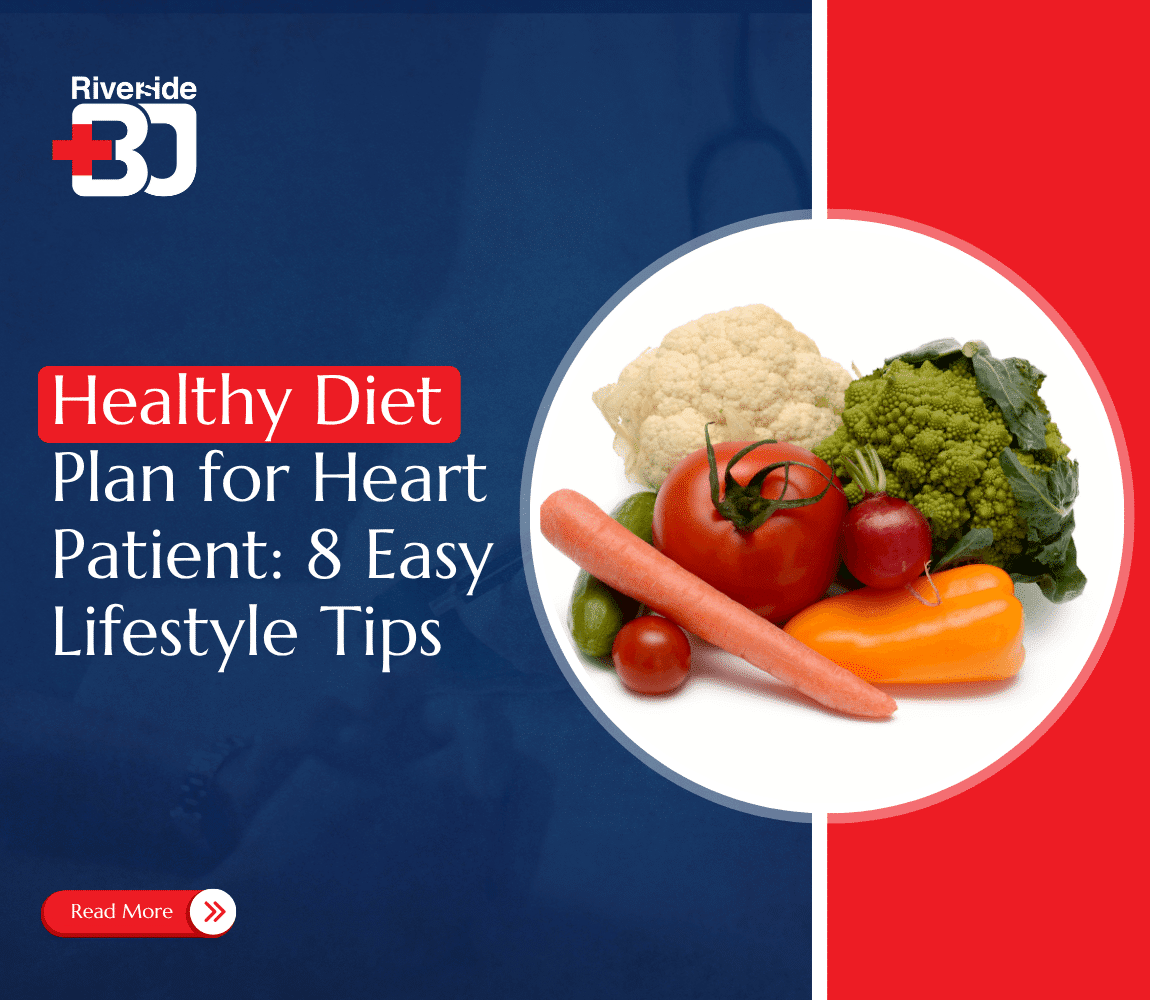A healthy diet plan for heart patients plays a key role in preventing serious complications.
But why worry about heart health? Well, according to the WHO, heart disease remains the world’s leading cause of death, claiming 17.9 million lives annually.
This alarming figure reflects the growing need to prioritise cardiovascular health through everyday choices. What you eat directly impacts blood pressure, cholesterol, and weight. These are the three major risk factors.
In this blog, we’ll guide you through 8 practical tips for a healthy heart through food. We will help build a lifelong healthy diet plan for heart patients that’s both simple and effective.

What is a Heart-Healthy Diet?
A healthy diet plan for heart patients includes natural, unprocessed foods that support cardiovascular function and lower risks.
The New England Journal of Medicine reports that the Mediterranean diet can cut heart disease risk by almost 30%. This indicates that food plays a direct role in long-term heart protection.
Key features of a heart-healthy diet:
- Plenty of vegetables and fruits
- Whole grains instead of refined options
- Lean protein from fish or legumes
- Healthy fats like olive oil and nuts
Ultimately, a healthy diet plan for heart patients strengthens the heart through a consistent and thoughtful nutrition. Therefore, it supports lifelong cardiovascular wellness through mindful and healthy daily eating habits.
To build on this foundation, let’s explore key nutritional guidelines for protecting your heart everyday.
Key Nutritional Guidelines
Understanding the key nutritional guidelines helps ensure a heart health, control cholesterol, and prevent cardiovascular conditions. Ultimately, balanced nutrition plays a vital role in managing heart disease risks.
Some of the major nutritional guidelines include:
- Firstly, a healthy diet plan for heart patients focuses on reducing unhealthy fats. Meanwhile, it also increases nutrient-dense whole grains, fruits, and vegetables.
- Next, consume healthy fats from sources like avocado, olive oil, and nuts to support cardiovascular function. They help to maintain cholesterol levels.
- Incorporate lean proteins like fish, chicken, and plant-based options to promote heart health without the risk of high cholesterol.
- Lastly, ensure a high intake of fibre through vegetables, fruits, and whole grains. It furthermore helps aid digestion and lower cholesterol levels.
By following these guidelines, a healthy diet plan for heart patients can significantly reduce the risk of heart disease over time.
Now, let’s explore practical steps you can take to prevent heart disease and protect your health.
Steps To Prevent Heart Disease
To prevent heart disease, lifestyle changes play an important role. A healthy diet plan for heart patients is key in reducing risks and maintaining overall health.
By following these steps, you can safeguard your heart.
- Vegetables And Fruits
A healthy diet plan for heart patients should incorporate a variety of vegetables and fruits. That is because they provide essential vitamins, minerals, and fibre that support cardiovascular health.
Moreover, by including colourful produce, you help reduce cholesterol, manage blood pressure, and prevent heart disease.
Not only that, the antioxidants in fruits and vegetables also protect against inflammation, which is a major contributor to heart disease. Subsequently, they help in improving blood vessel functions and in enhancing the overall heart health.
- Controlled Portion Sizes
Controlling portion sizes is vital for maintaining a healthy weight and reducing the risk of heart disease. Overeating leads to obesity, which is linked to high blood pressure, high cholesterol, and an increased risk of heart attack.
Hence, by opting for smaller portions, you help regulate calorie intake, prevent weight gain, and keep your heart healthy. A healthy diet plan for heart patients involves understanding and managing portions to achieve long-term health benefits.
- Limit Unhealthy Fats
Unhealthy fats like trans fats and excessive saturated fats should be avoided for heart disease prevention. Subsequently, these fats raise the bad cholesterol (LDL), which leads to plaque buildup in the arteries. Therefore, it is a key factor in heart disease.
- Limit processed foods, fried foods, and baked goods high in trans fats.
- Choose healthier fats like avocado, olive oil, and fatty fish.
- Read food labels to identify hidden unhealthy fats.
By incorporating these in a healthy diet plan for heart patients, one can protect oneself against clogged arteries and reduce the risk of heart disease.
- Reduce Sodium And Salt
Excess sodium can lead to high blood pressure which is a major risk factor for heart disease.
Aiming to reduce salt intake is crucial for lowering blood pressure and protecting the heart. Therefore, it is important to avoid processed, canned, and salty foods which often contain high levels of sodium.
By seasoning food with herbs and spices instead of salt, you can enjoy meals. They are not only heart-healthy, but also flavourful, so you don’t sacrifice taste.
- Choose Low-Fat Protein Sources
Low-fat protein sources are essential for maintaining heart health by helping to reduce cholesterol levels and manage weight.
On the one hand, high-fat proteins like fatty meats can raise bad cholesterol, on the other lean proteins like fish, chicken, and plant-based options like beans, lentils, and tofu provide the necessary nutrients.
Choosing these options regularly will support a healthy diet plan for heart patients. Furthermore, it will help in promoting cardiovascular health and reducing the risk of heart disease.
- Include Healthy Fats And Oils
Healthy fats, such as monounsaturated and polyunsaturated fats, play an important role in reducing heart disease risk.
Including sources like olive oil, nuts, avocados, and fatty fish can help improve good cholesterol (HDL) while lowering bad cholesterol (LDL). Not only that, but these fats also reduce inflammation, enhance blood circulation, and support overall heart health.
Ultimately, incorporating these healthy fats into your diet as part of a healthy diet plan for heart patients is beneficial. They support long-term cardiovascular wellness and contribute to an overall better quality of life.
- Use Herbs And Spices
Herbs and spices not only add flavour, but also ensure a healthy heart. Many herbs and spices contain antioxidants that help reduce inflammation and improve circulation. Hence, supporting a healthier heart.
Some of the herbs and spices are:
- Turmeric, garlic, and ginger to boost heart health naturally.
- Cinnamon can help lower cholesterol levels when added to daily meals.
- Basil and oregano provide essential nutrients and antioxidants to support overall heart health.
A healthy diet plan for heart patients includes these heart-boosting herbs and spices to prevent disease and enhance the flavour.
Incorporating these steps into your daily routine can significantly reduce the risk of heart disease. A healthy diet plan for heart patients is an ongoing commitment. Ultimately, by making the right choices, you’ll protect your heart for years to come.
While eating the right foods supports your heart, it’s equally vital to know what to limit or avoid. Let us take a look at the foods to avoid.

Foods to Limit or Avoid
Knowing which foods to limit helps build a consistent and heart-friendly lifestyle. With small adjustments, a healthy diet plan for heart patients becomes achievable, sustainable, and genuinely transformative over time.
The following are some foods to limit.
- Red And Processed Meats
Limiting red and processed meats is vital for heart health. In fact, according to the National Institutes of Health, consuming processed meat has a 42% higher risk of coronary heart disease (CHD) compared to unprocessed meat.
Hence, meat is one of the foods to avoid after a coronary bypass surgery.
That being said, while meat may taste tempting, it’s high in saturated fat and sodium. Therefore, instead of bacon or sausage, choose plant-based or lean alternatives.
This small shift contributes significantly to a healthy diet plan for heart patient. As a result, it improves long-term cardiovascular well-being.
- Sugar-Sweetened Foods
Many people ask, “Will diabetes affect my heart health?” The answer is yes. Sugary treats can lead to weight gain, leading to diabetes, which strain your heart.
Moreover, sugary drinks and snacks often replace more nutritious options. Therefore, it’s wise to opt for whole fruits or unsweetened alternatives. Even choosing yoghurt without added sugar helps.
While sweetness is enjoyable, long-term heart health should always come first. This matters greatly when building habits around a healthy diet plan for heart patients and everyday nourishment.
- Refined Carbohydrates
Refined carbohydrates, like white bread and pastries, spike blood sugar and lead to fat accumulation. Furthermore, these foods lack fibre and cause digestion to slow and blood pressure to rise.
Instead, aim for whole grains such as oats, brown rice, or whole wheat bread. Over time, these swaps make a noticeable difference in a healthy diet plan for heart patients.
While refined foods are convenient, their long-term effects are harmful. Hence, shunning refined carbohydrates is essential, particularly for those conscious about their cardiovascular health and dietary balance.
- Alcohol
Although some believe small amounts of alcohol may benefit the heart, excessive drinking increases blood pressure. Additionally, many alcoholic drinks are packed with sugar and calories.
This not only affects weight but also impacts liver and heart health. For a healthy diet plan for heart patients, drinking should be avoided as much as possible. Instead, staying hydrated with water or herbal teas makes a bigger positive impact on your health journey.
While moderation is often the key, being informed and disciplined can transform daily choices.
Let’s now explore how to translate this guidance into a practical, 7-day heart-healthy meal plan.
7-Day Heart-Healthy Meal Plan
Creating a heart-focused meal plan doesn’t mean sacrificing taste. With thoughtful planning and variety, each day can support a healthy diet plan for heart patients without feeling restrictive.
Now, let us look at a weekly healthy diet plan for heart patients.
- Day 1: Fibre-Rich Start
Fibre-rich meals kickstart the week and promote digestion and heart health. Prioritise ingredients that support cholesterol balance.
- Breakfast– Start with oats, berries, and almonds.
- Lunch– Add lentil soup with whole grain toast.
- Dinner– Include grilled tofu, quinoa, and steamed spinach.
A healthy diet plan for heart patients often begins with fibre, which is known to improve cholesterol levels.
- Day 2: Colourful Choices
Adding colour to your meals brings diversity in nutrients. It’s a delicious way to nourish the heart daily.
- Breakfast– Choose vegetable upma paired with fruit.
- Lunch- Try brown rice, mixed dal, and cucumber salad.
- Dinner- Include sautéed mushrooms and whole wheat roti.
Moreover, varied nutrients support better cardiovascular health.
- Day 3: Omega-3 Focus
Omega-3s are heart heroes. Starting midweek with healthy fats strengthens arteries and lowers triglyceride levels effectively.
For breakfast, have a flaxseed smoothie with banana and oats. For lunch, try grilled salmon, couscous, and greens. Finally, to end the day with dinner, have pumpkin soup, walnuts, and boiled beans.
Furthermore, a healthy diet plan for heart patients includes omega-3s that reduce inflammation and blood pressure.
- Day 4: Potassium-Packed
Potassium balances sodium and helps regulate blood pressure. Keep this nutrient consistent across your meals for better heart function.
- For breakfast, eat poha with peanuts and lime.
- For lunch, choose rajma with millet roti and spinach.
- To call it a day with dinner, have vegetable stew and barley.
Potassium-rich meals help balance sodium and support heart rhythms. Hence, they enhance a healthy diet plan for heart patients and everyday cardiac function.
- Day 5: Whole Grain Fuel
Whole grains provide long-lasting energy and essential nutrients. Make them your main source of carbohydrates throughout the day.
- Morning: Have multigrain porridge with raisins.
- Lunch: Eat bajra khichdi and tomato chutney.
- Evening: Have moong soup with roasted vegetables.
Moreover, whole grains help maintain blood sugar levels and support overall cardiovascular health effectively as part of a healthy diet plan for heart patients.
- Day 6: Balanced Bowl
Balance is key. Hence, combine proteins, complex carbs, and vegetables that support sustained energy and heart health.
- In the morning, start with sprouts chaat and a boiled egg.
- For lunch, have brown rice, palak paneer, and salad.
- In the evening, have grilled chicken, sweet potato mash, and green beans.
Balanced meals remain essential in a healthy diet plan for heart patients every single day.
- Day 7: Gentle Sunday
Sundays should still serve your heart. Keep it light yet nutrient-dense with mindful, comforting meals.
- For breakfast, you can try avocado toast and herbal tea.
- Lunch includes lemon quinoa, tofu cubes, and sautéed kale.
- For dinner, have something like vegetable biryani with curd.
Finally, even on rest days, a healthy diet plan for heart patients must stay nutrient-rich yet simple.
Although the meals vary each day, the core idea remains constant: nourishing the heart. Sticking to a healthy diet plan truly supports long-term cardiovascular strength and vitality.

Conclusion
A healthy diet plan for heart patients is more than just a routine, it’s a lifestyle shift. By making mindful food choices daily, you can reduce heart risks. Ultimately, you can improve your overall energy and feel more in control of your well-being.
The journey might seem slow at first, but every small step counts.
If you’re ready to commit to better heart health, let Riverside B&J Hospital support your goals. We offer a healthy diet plan for heart patient crafted with care and balance. No guesswork, no compromise, just nutrition that works.
Explore our heart-healthy range today and take the first step toward lasting change.
FAQs
- What Is the Best Healthy Diet Plan for Heart Patients?
A balanced diet with whole grains, lean proteins, and healthy fats is the best healthy diet plan for heart patients.
- Can I Follow a Healthy Diet Plan for Heart Patients Without Giving Up My Favourite Foods?
Yes, moderation is key. You can enjoy occasional treats while focusing on nutrient-dense, heart-supporting meals.
- How Does Riverside B&J Hospital Help with a Healthy Diet Plan for Heart Patients?
Riverside B&J Hospital prepares carefully portioned, heart-healthy meals that align perfectly with expert-recommended diet guidelines.
- Are Fats Completely Avoided in a Heart-Healthy Diet?
Not at all. Healthy fats like olive oil, nuts, and seeds are encouraged in moderation for heart support.
- How Much Sodium Should a Heart Patient Consume Daily?
Ideally, sodium intake should be limited to under 1,500 mg per day to maintain healthy blood pressure levels.

